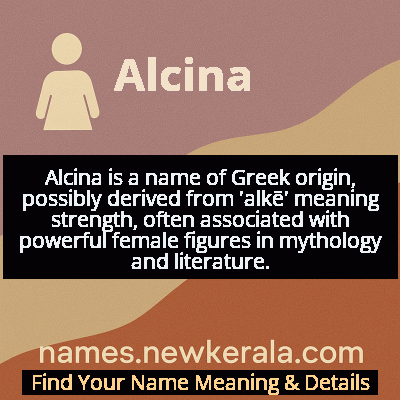Alcina Name Meaning & Details
Origin, Popularity, Numerology Analysis & Name Meaning of Alcina
Discover the origin, meaning, and cultural significance of the name ALCINA. Delve into its historical roots and explore the lasting impact it has had on communities and traditions.
Name
Alcina
Gender
Female
Origin
Greek
Lucky Number
4
Meaning of the Name - Alcina
Alcina is a name of Greek origin, possibly derived from 'alkē' meaning strength, often associated with powerful female figures in mythology and literature.
Alcina - Complete Numerology Analysis
Your Numerology Number
Based on Pythagorean Numerology System
Ruling Planet
Uranus (Rahu)
Positive Nature
Strong sense of order, loyal, practical, and disciplined.
Negative Traits
Stubborn, overly serious, rigid, and prone to feeling restricted.
Lucky Colours
Blue, gray.
Lucky Days
Saturday.
Lucky Stones
Blue sapphire.
Harmony Numbers
1, 7, 8.
Best Suited Professions
Managers, engineers, accountants, organizers.
What People Like About You
Dependability, discipline, practicality.
Famous People Named Alcina
Alcina Lubitch
Composer and Musician
Internationally recognized for contemporary classical works blending diverse cultural influences
Alcina Rodrigues
Folk Singer
Preserved and popularized traditional Goan music heritage through extensive recordings
Alcina Tavares
Educator and Activist
Pioneering work in women's education and social development in Cape Verde
Name Variations & International Equivalents
Click on blue names to explore their detailed meanings. Gray names with will be available soon.
Cultural & Historical Significance
The name also carries significance through its masculine root Alcinous, the wise king from Homer's Odyssey who represents hospitality, civilization, and the safe return home. This dual heritage gives Alcina a complex cultural footprint—simultaneously embodying wild, transformative magic and civilized, welcoming authority. Throughout art history, Alcina has been depicted by major artists including Giovanni Lanfranco and William Hogarth, always representing the tension between sensual appeal and moral peril. Her enduring presence in opera, literature, and visual arts demonstrates how mythological figures adapt to reflect changing cultural concerns about power, gender, and morality.
Extended Personality Analysis
The name Alcina suggests a personality marked by magnetic charisma, intellectual depth, and transformative influence. Those bearing this name are often perceived as natural leaders with strong intuitive abilities and creative problem-solving skills. The mythological background implies someone who can dramatically affect their environment and relationships, possessing what might be called 'enchanting' social skills. However, this powerful personality comes with complexity—Alcinas may struggle with balancing their strong will with emotional vulnerability, and their transformative energy can sometimes manifest as controlling tendencies if not channeled constructively.
Modern name psychology associates Alcina with high intelligence, artistic talent, and strategic thinking. These individuals typically excel in fields requiring persuasion, creativity, and vision. They're often drawn to leadership roles but may prefer influencing from behind the scenes rather than direct authority. The dual heritage of sorceress and royal host suggests someone capable of great warmth and generosity but also possessing formidable defenses when threatened. Relationships with Alcinas tend to be intense and transformative, as they naturally inspire change in those around them. Their greatest challenge lies in using their considerable influence ethically and avoiding the mythological fate of turning away from relationships when they become challenging or routine.
Modern Usage & Popularity
In contemporary naming practices, Alcina occupies a unique niche as a sophisticated, literary choice that appeals to parents seeking mythological names with strong feminine energy. While statistically rare—appearing outside most national naming charts—it enjoys consistent usage among families with Greek, Italian, or Portuguese heritage, as well as classical education enthusiasts. The name has experienced a modest revival alongside the broader trend of mythological and ancient names, though it remains far less common than similar choices like Athena or Circe. Its usage is particularly notable in Brazil and Portugal, where the 'Al-' prefix fits linguistic patterns and the name feels both exotic and familiar. Modern Alcinas often go by nicknames like Allie, Cina, or Lina to make the distinctive name more accessible in daily use. The name's rarity ensures it stands out while its classical roots provide substantial cultural credibility, making it an ideal choice for parents wanting something unique but not invented.
Symbolic & Spiritual Meanings
Symbolically, Alcina represents the profound connection between transformation, desire, and the natural world. Her mythological practice of turning lovers into trees, stones, or animals embodies the cycle of passion and its dissolution back into elemental forms—suggesting that all human emotions ultimately return to their fundamental natural states. This transformation symbolism speaks to the alchemical process of personal growth through relationships and experiences. The name also carries the symbolic weight of illusion versus truth, as Alcina's enchantments typically create beautiful but false realities that must eventually be broken for genuine connection to occur.
Metaphorically, Alcina represents the power of feminine creativity and its potential to both build and destroy. Her connection to natural elements (trees, stones, animals) symbolizes the raw, untamed aspects of creativity that exist outside civilized constraints. The duality between the sorceress Alcina and her royal counterpart Alcinous creates a rich symbolic tension between wild nature and civilized order, intuition and reason, freedom and responsibility. In psychological terms, Alcina can represent the transformative journey of integrating one's shadow self—the powerful, potentially dangerous aspects of personality that must be acknowledged and harnessed rather than suppressed. For modern bearers, the name serves as a reminder of their capacity for profound personal and creative transformation.

